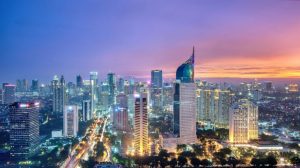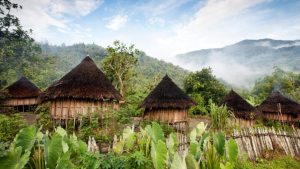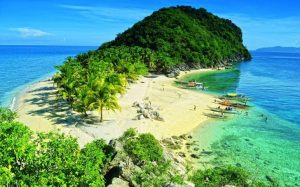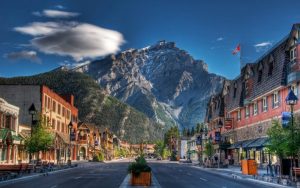Indonesia is a vast archipelagic nation in Southeast Asia, stretching between the Indian and Pacific Oceans.
It consists of over 17,000 islands, though only about 6,000 are inhabited.
The country shares land borders with Malaysia, Papua New Guinea, and Timor-Leste, while its maritime boundaries connect it to Australia, the Philippines, and other regional neighbors.
Indonesia is the world’s fourth-most populous country, with a population exceeding 270 million.
Visitors can experience diverse ethnic groups, languages, and cultures.
Historically, Indonesia was a crucial part of global trade networks, drawing merchants from India, China, and the Middle East.
Hindu-Buddhist kingdoms flourished for centuries before Islam became the dominant religion by the 16th century.
In the early 17th century, the Dutch colonized Indonesia, controlling the lucrative spice trade.
After a long struggle, Indonesia declared independence in 1945 and gained full sovereignty in 1949.
In 2023, the country saw 738 million tourists.
Visitors are drawn by its stunning landscapes, from tropical beaches to active volcanoes and dense rainforests.
Some of the top destinations include:
- Bali – Known for its beaches, temples, rice terraces, and nightlife, Bali is Indonesia’s tourism hub. It appeals to everyone, from surfers and honeymooners to digital nomads and backpackers.
- Jakarta – Indonesia’s capital, is a massive, chaotic city, but it has great food, historical sites, and shopping. It’s more of a business and cultural stop than a vacation spot.
- Komodo National Park – The only place in the world where you can see Komodo dragons in the wild. The islands also have incredible diving spots.
- Borneo (Kalimantan) – Home to wild orangutans in Tanjung Puting National Park and vast jungles, Kalimantan is a paradise for ecotourism.
The country’s deep spiritual traditions, ancient temples, and vibrant art scenes offer a unique cultural experience.
Whether you want a bucket-list adventure or a relaxing experience unplugged from the hectic world, Indonesia meets you where you are.
Warnings & Dangers in Indonesia

OVERALL RISK: MEDIUM
Indonesia comes with a medium risk, but not in any way that you can plan for ahead of time beyond basic safety steps. We'll walk through the different concerns in this article, as well as the places to avoid.

TRANSPORT & TAXIS RISK: MEDIUM
This is a medium risk. Transportation in Indonesia is chaotic, whether by rental car, rideshares, taxis, or boats. Even the best regulations aren't consistently enforced. Hiring a private driver to get around on land and using the non-budget airlines to island hop might be the safest options.

PICKPOCKETS RISK: MEDIUM
This is another medium risk, as crime is a problem in congested areas that attract tourists, like Bali and Lombok. Dress to blend in with the crowd and don't display signs of wealth.

NATURAL DISASTERS RISK: HIGH
Indonesia sits on the Pacific Ring of Fire, making earthquakes, tsunamis, and volcanic eruptions a real concern. Flooding and landslides also happen during the rainy season. Treat this as a high risk because you need to know what to do if a worst-case scenario occurs.

MUGGING RISK: MEDIUM
This is another medium risk, and, quite frankly, just as possible as pickpocketing or purse snatching. Tourists have been robbed and even assaulted, especially at night and in areas not specifically for visitors. Police can be slow to respond, and language barriers don’t help. Keep your guard up at all times.

TERRORISM RISK: HIGH
Indonesia has a medium terrorism risk, with extremist groups targeting both government and civilian locations. While security forces have arrested many suspects, past attacks on police stations, churches, and public spaces show the risk is still there. In fact, terrorism is one of the reasons there's an elevated risk level in Indonesia.

SCAMS RISK: MEDIUM
Scams range from overpriced taxis and rigged money changers to fake tour operators and sob stories. Always agree on prices beforehand, use official transport apps, and avoid “helpful” strangers at ATMs. If a deal seems too good to be true, it probably is.

WOMEN TRAVELERS RISK: MEDIUM
Women have a medium risk here, with a spike in crimes toward women in 2024 and into 2025. For example, traveling alone could subject you to unwanted attention and harassment. Don't take drinks from strangers, as spiking of drinks is too common. Stick with groups during daylight hours and stay inside at night.

TAP WATER RISK: MEDIUM
Tap water in Indonesia isn’t safe to drink. Even locals stick to bottled or filtered water. Avoid ice in street stalls unless you're sure it's from a secure source. Brushing your teeth with tap water is usually fine, but if you have a sensitive stomach, use bottled water for that, too.
Safest Places to Visit in Indonesia
Indonesia’s official tourism website is “indonesia.travel.”
The site includes practical tips and things to do by region or interest.
The government also has a Bureau of Public Communication of the Ministry of Tourism, which can be reached at +62 21 3838899.
Since this country is so massive and spread out, we’re going to cover the things to do in the cities ranked as the Top 10 Tourist Destinations by the tourism bureau.
The world’s largest Buddhist temple is Borobudur, located in Central Java.
Wandering its nine stacked platforms adorned with intricate carvings is like stepping back in time.
Sunrise views are ideal, with a veil of mist over the region.
Imagine a volcanic lake so vast it has an island the size of Singapore!
Lake Toba in North Sumatra is perfect for relaxation.
Explore traditional Batak villages on Samosir Island, take a dip in the lake’s warm waters, or simply enjoy the cool climate and stunning views.
Located on Lombok’s southern coast, Mandalika is emerging as a prime destination.
Its pristine beaches like Kuta and Tanjung Aan are ideal for sunbathing and surfing.
The area also hosts cultural events, offering insights into local Sasak traditions.
This fishing town on Flores Island is the gateway to Komodo National Park.
Beyond spotting the famed Komodo dragons, the surrounding islands boast some of the world’s best diving spots, teeming with vibrant marine life and coral reefs.
In North Sulawesi, Likupang is a hidden gem with white-sand beaches and clear waters.
It’s a haven for snorkeling and diving enthusiasts, with rich marine biodiversity.
The area’s tranquility makes it perfect for those seeking a peaceful retreat.
Known as the “Island of the Gods,” Bali offers a mix of cultural landmarks, beaches, and vibrant nightlife.
Visit Uluwatu Temple perched on a cliff, relax in Ubud’s rice terraces, or enjoy the bustling scenes of Seminyak and Kuta.
An archipelago off West Papua, Raja Ampat is a diver’s paradise.
Its crystal-clear waters harbor over 1,000 fish species and three-fourths of all known coral species.
Above water, the karst island formations and secluded beaches are equally mesmerizing.
Located in North Maluku, Morotai is rich in World War II history.
Explore relics and museums detailing its past.
The island’s untouched beaches and clear waters also make it ideal for diving and snorkeling.
On Belitung Island, Tanjung Kelayang is famed for its unique granite rock formations and clear waters.
Island-hopping tours reveal secluded beaches and vibrant marine life, making it a picturesque getaway.
Indonesia’s bustling capital is a melting pot of cultures.
Explore Kota Tua’s colonial architecture, shop in modern malls, and indulge in diverse culinary delights.
Places to Avoid in Indonesia
Annually, around March, Bali completely shuts down for Nyepi, the Day of Silence.
No flights, no transportation, no businesses—everything stops for 24 hours.
During this time, even tourists must stay inside without using lights, music, or entertainment.
Hotels may limit food service, so plan ahead if you’re visiting during this time.
Check the tourism website and government advisories for the exact date.
Another place to avoid is Indonesian Papua, which can be unpredictable due to political tensions and occasional violence.
The region includes Central Papua and Highland Papua.
These places are listed as “Do Not Travel” in government advisories.
Foreigners have been targeted for kidnappings and attacks, especially in remote regions.
Even with a heavy police and military presence, your safety isn’t guaranteed.
Roads near mining areas have seen deadly incidents, and protests can disrupt travel.
In addition, your travel insurance could be deemed invalid if you visit a region that is on the Do Not Travel list.
I also encourage you to check recent headlines before your trip.
As of this publication date in early 2025, crime against tourists (especially women) is on the rise.
Safety Tips for Traveling to Indonesia
- Indonesia’s police force is called POLRI. In tourist areas like Bali, the Tourism Police assist foreigners. The general emergency number is 112, but responses can be slow. For immediate help, contact your embassy or a major hotel. Always report crimes at the nearest police station and your local embassy.
- Indonesia is prone to earthquakes, tsunamis, and volcanic eruptions. Download BMKG Info (Indonesia’s Meteorology, Climatology, and Geophysical Agency app) or enable Google’s SOS alerts on your phone. Follow local government advisories and know evacuation routes, especially in coastal or volcanic regions.
- Indonesia’s new criminal code (effective in 2026) penalizes defamation, blasphemy, cohabitation, and sex outside marriage (even for foreigners). While enforcement is still unclear, be mindful of public behavior, especially regarding political speech, online comments, and social norms. Avoid discussing religion or criticizing local authorities to stay out of legal trouble.
- The CDC recommends vaccines for hepatitis A & B, typhoid, and routine immunizations. Malaria and dengue fever are risks, especially in rural areas—use mosquito repellent with DEET and sleep under treated nets.
- Traffic is chaotic, and roads can be dangerous. An International Driving Permit (IDP) is required, but many tourists opt for taxis or ride-hailing apps instead. Motorbike rentals are common, but accidents are frequent. Always wear a helmet, avoid driving at night, and watch out for unpredictable local drivers.
- Many ferries in Indonesia are overcrowded and poorly maintained. Choose reputable operators (like BlueWater Express) and check life jackets before boarding. Avoid traveling during bad weather, and if a boat looks overloaded, don’t get on. Government-run ferries are safer than cheap, unregulated private options.
- Indonesia has strict drug laws—even for prescription meds. Some common medications (like strong painkillers and ADHD meds) are restricted or illegal. Always carry prescriptions in original packaging with a doctor’s note. Never bring cannabis-based products, even for medical use—they are strictly banned.
- Rip currents are strong, especially in Bali, Lombok, and Java. Swim only in designated areas with lifeguards and be cautious of changing tides. Jellyfish and sea urchins are also hazards. Some beaches have hidden coral or sudden drop-offs, so always check conditions before diving in.
- Monkeys in places like Uluwatu and Ubud Monkey Forest are cute but aggressive thieves. Keep sunglasses, hats, and phones secured. Never feed them or make eye contact—it’s seen as a challenge. If one grabs your stuff, don’t fight it; instead, offer food or let staff retrieve it.
- Dress modestly outside tourist areas—cover shoulders and knees in temples or villages. Bali is more relaxed, but topless sunbathing is not acceptable. If boating or fishing, check if a permit is required, especially in marine protected zones. Some waters are sacred—ask locals before fishing.
So... How Safe Is Indonesia Really?
Government agencies from the U.S., Canada, and the United Kingdom regularly issue safety and travel advisory levels for all foreign countries.
The scale is four-tiered, with one being the lowest and four being the highest.
For Indonesia, here are the rankings:
- US – Level 2: Exercise Increased Caution
- UK – “FCDO advises against all travel to parts of Indonesia.”
- Canada – Level 2: Exercise a high degree of caution
- Australia – Level 2: Exercise a high degree of caution
Each country also puts a Level 4 risk on Central Papua and Highland Papua for the reasons listed above in the “Places to Avoid” section.
Terrorism and the risks of natural disasters are the main reasons for the elevated advisory levels from foreign governments.
For crime at the local level, read the article in the Bali Sun titled “Bali Governor Reveals Plans To Tackle Rising Crime In Tourist Hotspot.”
You can get a sense of what is going wrong and what is being done to correct the problem.
Another helpful article is “Bali Tourists Issued New Safety Advice After Rise in Robberies.”
The Chief of Police of Kuta, AKP Agus Riwayanto Diputra, stated in that article, “Tourists are urged to be careful, do not give the perpetrator a chance,” in response to a tourist robbery where the victim was wearing a gold chain.
While there are risks in Indonesia, savvy travelers should be able to enjoy the experience by following this safety guidance and staying on top of recent scams and headlines.
How Does Indonesia Compare?
| Country | Safety Index |
|---|---|
| Indonesia | 58 |
| Djibouti | 38 |
| Croatia | 83 |
| Mexico | 65 |
| France | 64 |
| Puerto Rico | 34 |
| Somalia | 16 |
| United Kingdom | 77 |
| Peru | 50 |
Useful Information

Visas
Most travelers need a visa to enter Indonesia, but it’s pretty straightforward. Many nationalities can get a Visa on Arrival (VOA) for 30 days, extendable once. If you’re staying longer, look into e-visas or social visas. Always check the latest rules—Indonesia updates them more often than you’d expect.

Currency
Indonesia uses the Indonesian Rupiah (IDR), and you’ll be dealing with lots of zeros—1 million rupiah sounds huge but is about 65 USD. Cash is still king in smaller towns, so carry some, but use ATMs in banks to avoid skimming. In big cities, cards and mobile payments are common. Just don't ever let a merchant take your card out of sight.

Weather
It’s tropical, meaning hot and humid year-round, with a wet and dry season. Dry season (April to October) is the best for travel, while the rainy season (November to March) brings occasional flooding and travel disruptions. If you're heading to the mountains, expect cooler temps and even some mist.

Airports
Jakarta (CGK) and Bali (DPS) are the busiest airports, with decent facilities but long immigration lines. Many smaller airports connect the islands, though some have limited services and aren't always the safest. Domestic flights are common, but delays happen. Avoid budget airlines to get the safest form of air transportation.

Travel Insurance
Don’t skip it. Medical care in Indonesia varies, and serious cases may require evacuation. Get a policy for at least $100,000 USD. Insurance also covers lost luggage, cancellations, and those surprise motorbike crashes. Some policies even cover adventure sports, which is handy if you're diving or trekking. Just read the fine print—cheaper plans may exclude key coverage.
Indonesia Weather Averages (Temperatures)
Average High/Low Temperature
| Temperature / Month | Jan | Feb | Mar | Apr | May | Jun | Jul | Aug | Sep | Oct | Nov | Dec |
|---|---|---|---|---|---|---|---|---|---|---|---|---|
| High °C |
31 | 31 | 32 | 32 | 32 | 32 | 32 | 32 | 33 | 33 | 33 | 31 |
| Low °C |
24 | 24 | 24 | 24 | 24 | 23 | 23 | 23 | 24 | 24 | 24 | 24 |
| High °F |
88 | 88 | 90 | 90 | 90 | 90 | 90 | 90 | 91 | 91 | 91 | 88 |
| Low °F |
75 | 75 | 75 | 75 | 75 | 73 | 73 | 73 | 75 | 75 | 75 | 75 |
Indonesia - Safety by City
| City | Safety Index |
|---|---|
| Bali | 58 |
| Bandung | 78 |
| Denpasar | 60 |
| Jakarta | 54 |
| Medan | 62 |
| Surabaya | 80 |












Thanks a lot for good information of Indonesia given by you. I think to travell to
Indonesia, thailand, Malaysia, Hong kong, Brunei, etc countries of eastern side of the world.
za
the scam one is supposed to be high since the indonesians like to scam people
hmmm
pretty weird, im indonesian and i never been scammed in my own territory
Wrong
Not all indonesians
I visited Singapore recently and found it very safe to travel. It is really beautiful and clean. Although it is a bit costly but the beautiful Sentosa , universal studios, garden by the bay are worth the money paid. According to me, a person should visit Singapore once in his or her lifetime.
Ok, but this is not about Singapore but Indonesia…
LOL
Someone needs a geography lesson.
Lol Fr
Best of all
My family in Jawa tengah…. Cause these virus corona…. I can’t go back to them…. When… When is the same time I want to go back.
I miss my family
YOUR GRAMMAR IS UNIQUE
Learn English
What a dumb reply. Not even a slightly clever troll
Thank you so much
This was very very use ful for my geography report on Jakarta thank you so much
So thank you and I have a lot of knowledge
very good
It is very helpful on the safety part on my Geography Report on Indonesia
Amazingly Welcoming
I had an absolutely amazing time visiting this country. Everyone I personally met was extremely helpful and friendly and especially patient with me through a language barrier. Bottom line, this country will fail to disappoint and the best places, for me, were places off of the beaten tourist path to immerse yourself in the culture and really nice locals. And the folks there just have a generally greeting nature and vibe from everything I’d experienced. I’ll go back, for sure.
Asking for information
That is good to know. I am thinking of visiting there too. Is there camping and outdoor stuff to do? Thank you
Indonesia is cool in full of the beautfuls girls ever
I love indonesia girls
💀💀💀💀💀💀
Great.
You can’t expected before you coming, all people are welcome always smile make a positive energy when you going place to place. so someday i hope can coming again.
BTW If your lgbtq dont go I almost got put to death :/
Stay the hell away!
DANGER! BEWARE! Terrorists could be lurking around anywhere…don’t risk your life.
They can be anywhere in Europe, also.
Stop it
Just because Indonesia is Muslim doesn’t mean it’s ridden with terrorists.
Lol
Then whats the point of going there and thanks I know what to right about Indonesia and that they are scammers, terrorists, rapist etc
Cheap and good
Been to Indonesia many times. My wife love to shop there Before Christmas. Is safe to travel there, the people are helpful and polite. other countries we went, wasn’t as good as Indonesian
hospitality.
Bali
Not sure about the other parts, but Bali is pretty safe. Only thing to watch out for is when you are shopping, people often try to rip you off, and try really hard to sell their products, so try not to be pressured into buying things you don’t need. Other than that Bali is very safe.
Life in Indonesia
I lived in Malang Indonesia for about 8 years. During my entire time in the country, I only had – 1 maid that we caught stealing. She was stealing the money out of my bedside table but never removed any of it from our home, she hid it in her room. I found the local people to be truly polite and helpful in any way possible. Health care is extremely poor and their Doctors are the least educated and the worst in the world.
I spent 30 years working and traveling to different countries of the world so I speak about medical care from experience, in addition, I am a Paramedic from the USA and people in the USA get better and more advanced care thru EMS in the USA than a major hospital in Indonesia.
In Malang, their biggest and most advanced hospital had 1 cardiac monitor for the entire hospital of about 300 beds. With dengue fever and Malaria being major health risks I found this totally unacceptable by Western standards. I actually saw medical mistakes take many lives when living there and if I became ill. I went to Singapore.
Other than health care I love Indonesia and since I have now retired I am really thinking about moving back there. The cost of living is pennies compared to the USA and I personally would trust an Indonesian before almost any American I know. If you travel there you will really feel welcome and enjoy yourself immensely.
Good Outline
I am an Indonesian and have been living in Indonesia with occasional travels abroad. Having been travelling within Indonesia, I would say the travel safety outline is almost 100% correct. Larger cities are less safe and smaller towns are mostly very safe. With the exception of certain provinces which have seen conflicts.
Your warning about public transportation is unfortunately correct, particularly in Jakarta. Almost everyone who uses public transportation experiences encounter with pickpockets, some more than one time. I am included.
One thing to add (if appropriate), traffic safety. Please be reminded, bad driving manner is persistent not only amongst motorists. You have to be very careful with practically every vehicle nearby.
EW JAMIE
Idk indonesia Jamie is. creep